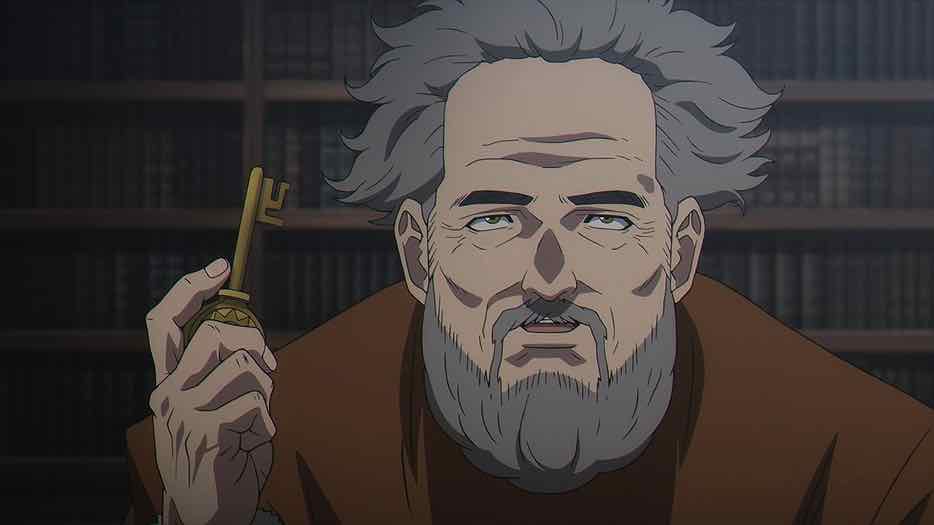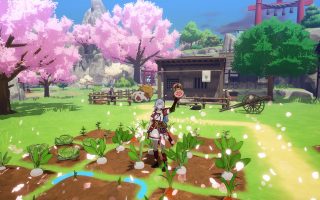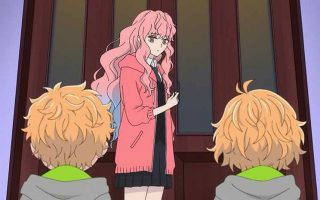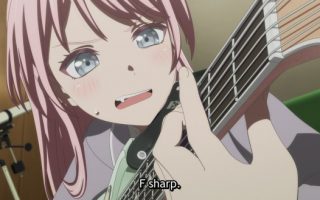It’s no newsflash that Chi:. Chikyuu is a pretty tremendous piece of work. The anime far outpaces the manga for me, though I suspect that if I were to give that another chance now I might feel more favorably disposed. This series is, effectively, a very young (like 20 when Uoto wrote this) smart person reflecting on the great truths of existence. I happened upon the Doshisha University culture festival today. I always enjoy college bunkakai, as they remind me of how that’s the age when human conceit is at its most vigorous. A sense of physical indestructibility combined with the assuredness that one knows anything which might possibly prove worth knowing. It’s invigorating and amusing to observe.
Ostensibly the MacGuffin of Orb is the pursuit of the heliocentric model. But it’s really about truth more than anything else. Everything that happens is less about the Sun and Earth than the truth and one’s personal relationship with it. “Audacious” is very much an appropriate theme. Uoto celebrates the intellectual restlessness of the young and decries the stubbornness of the old, like any good 20 year-old intellectual. Of course the reality is more nuanced than that, but sometimes it takes someone with intellectual clarity – even if its misplaced – to break through the bonds of ignorance. THat’s what audacious really means in this context, and it’s why I find the series’ perspective more charming than irritating.
This is also why the series’ liberal take on historical events doesn’t bother me (it seems to bother the hell out of some people). Count Piast and the Professor who mentored him are clearly based loosely on Tycho Brahe, the Danish astronomer (and alchemist) who championed something like a “hybrid” model of the universe. The thing is Brahe came along a good bit later than Chi.: Chikyuu is set, and while he did end up working in Prague (after the King of Denmark – a former patron – sent him into exile) there’s no record of his ever setting foot in the “P Kingdom”.
But it doesn’t matter – this is an allegorical story, not a history textbook. Brahe’s role in the journey of astronomy is an important and fascinating one, and he’s remembered for his many vital contributions to it rather than for his fundamental interpretation being wrong. The lesson of Piast’s life in this series is that in science, one should never become so enamored of an idea that they lose the ability to interpret reality. “Failure is always an option”, as the Mythbusters said. The truth is the truth – data must be viewed dispassionately, without prejudicing it with preconceived notions or indeed desires.
The problem here is Piast’s devotion to his mentor, the cousin who took him in and taught him. And that Professor’s own devotion to his own ideas, which he dedicates his life to proving. I don’t think anyone could doubt the Professor’s since devotion to empirical observation. But he faced a Sisyphean task – no matter how long he worked on proving his “double epicycle” model, the finish line always eluded him. At some point what took precedence was his desire for it to be true. Because it would be so beautiful if it was, a celebration of all he found holy and good.
Here, again, truth rears its ugly head. Because no matter how hard we want it, wanting something to be true doesn’t make it true. That’s the nature of truth – it’s impassive and immovable. It doesn’t care what anyone wants or doesn’t want. The Professor’s mistake was his devotion to a truth he believed was true because it was beautiful. In fact, true science must believe that the truth is beautiful, even when it’s ugly, simply because it’s true. This desire was passed on to Piast, who dedicated himself to justifying the life’s work of a man he loved. So much so that he discounted physical evidence he collected with his own eyes, because it was inconsistent with the Professor’s truth.
That evidence was the final phase of Venus. I’m no astronomer but the basic idea here is that if indeed the Sun moved as in the geocentric model (or the hybrid) one should never be able to see Venus in its full form. Doing so doesn’t necessarily prove heliocentrism but it does prove that Venus orbits the Sun – and in doing so, disproves both the Ptolemaic and Brahe models. Therefore Piast disregarded what he saw with his own eyes because it was inconsistent with his preconceptions – pretty close to a scientific original sin. And he compounded that sin by averting his eyes from it evermore so as not to confirm what he knew in his heart to be true.
All this is a reminder that in the days before telescopes, eyesight was a critical factor in astronomical observation. The young Piast had it, and Oczy now has it. Oczy has been a passenger in all this, dragged along in the wake of other more educated and powerful men (and girls). But he’s now coming to see the beauty in truth – to accept the idea that there may indeed be beauty in this foul Earthly realm. When Piast issues his challenge – if the trio want access to his records, they must confirm or deny what he saw those decades ago – Oczy finds himself hoping that he sees Venus in its final phase. And that’s as moving as anything that’s happened in the series so far if you ask me.
It would be easy to dismiss both the Professor and Piast’s lives as a tragic waste. But in the end, both reluctantly let go of their dreams and accepted that only the truth abides. And in doing so, their service – like Brahe’s – became invaluable in the pursuit of it. There are no failures in honest scientific exploration – every misstep taken is one those who follow can avoid. Whatever role the likes of Oczy – now so changed by his experiences that he longs to read and write – and Jolenta play is incidental in that larger journey. But it’s still a vital part in making that journey a personal story, which is the role of narrative fiction. And Chi:. Chikyuu is excelling at doing that.
The post Chi.: Chikyuu no Undou ni Tsuite (Orb: On the Movements of the Earth) – 09 appeared first on Lost in Anime.




